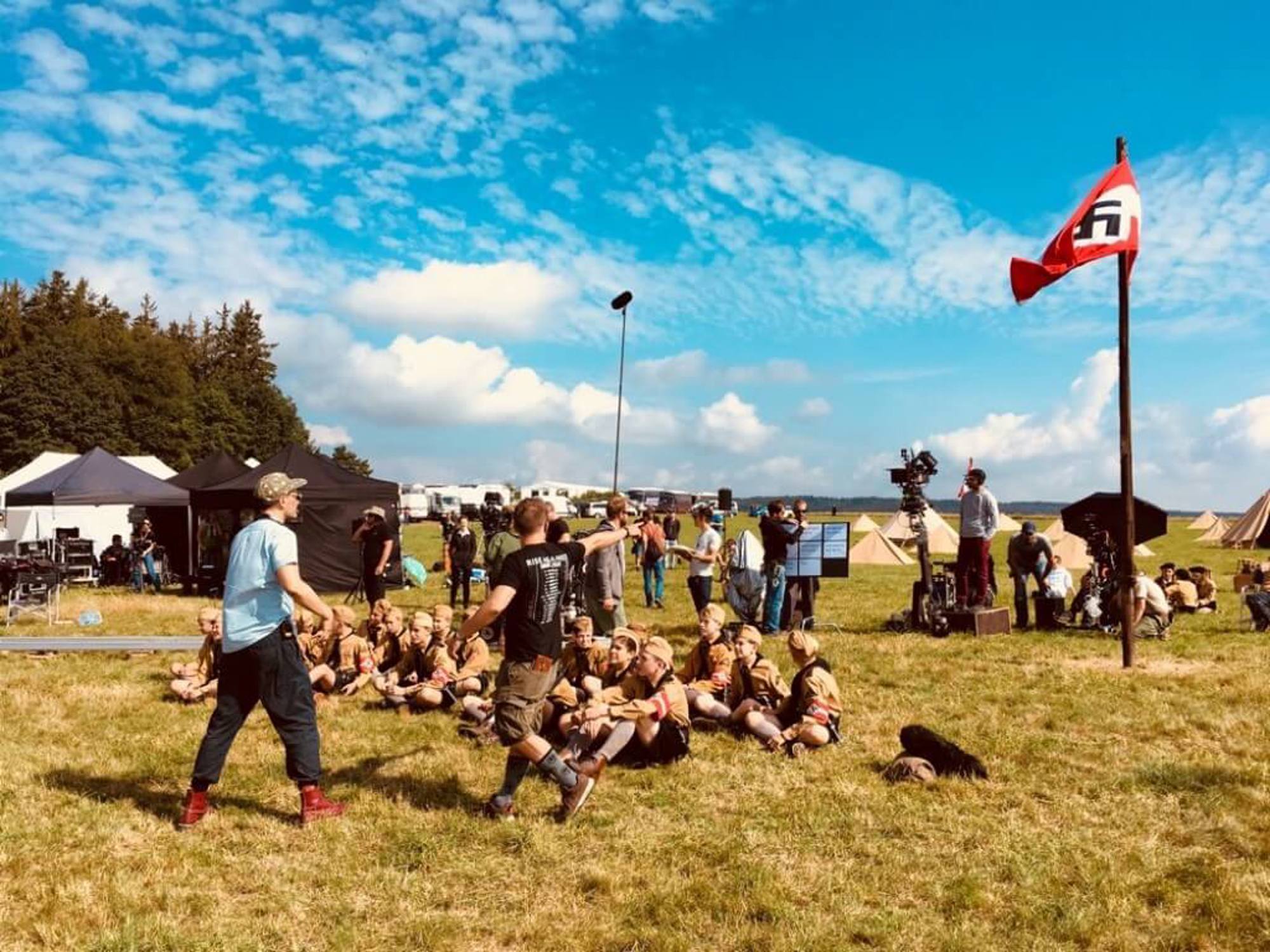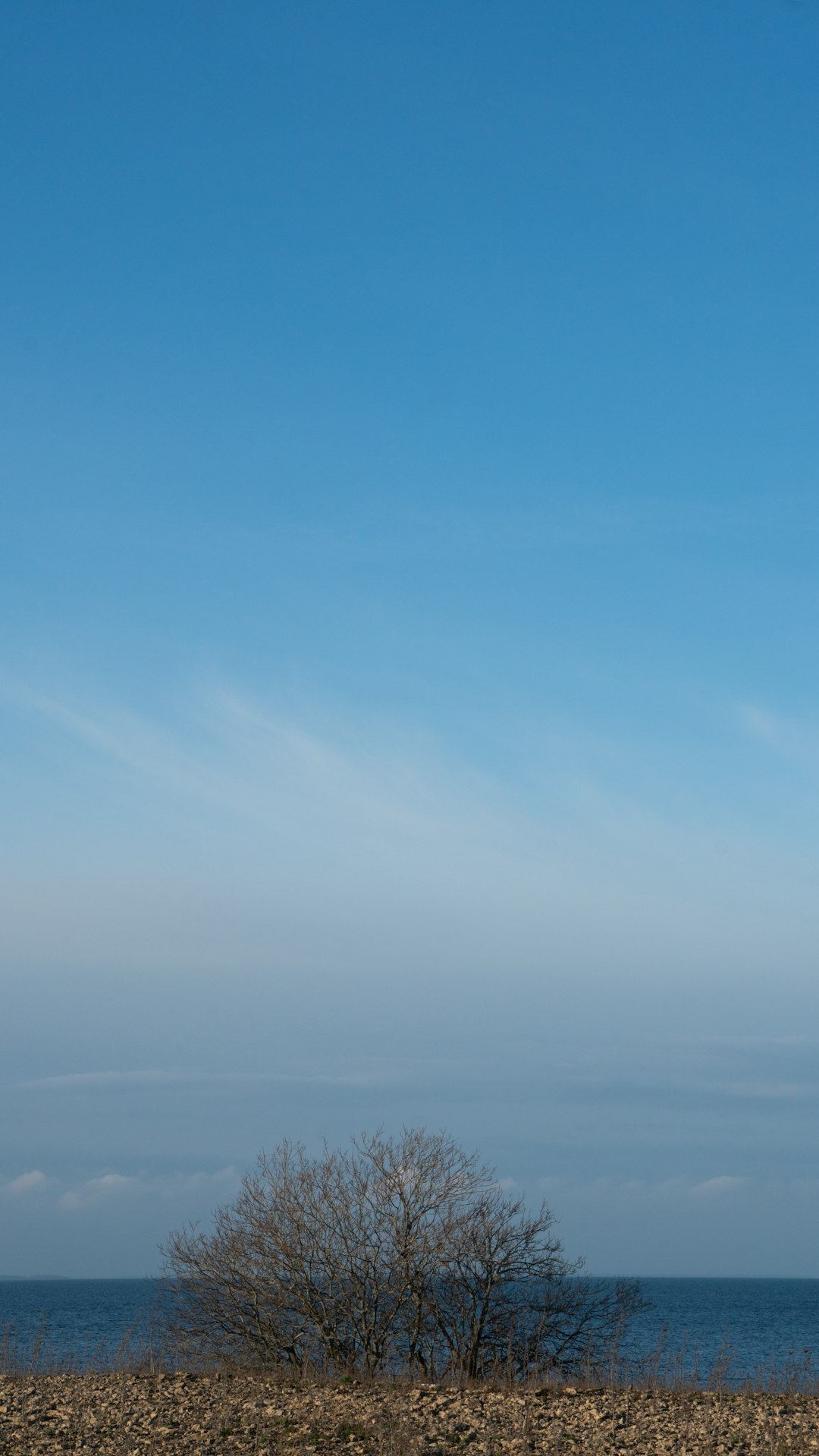Once the decision was made to film Jojo Rabbit exclusively in the Czech Republic, film director Taika Waititi and producer Carthew Neal approached local filmmakers via Czech production company Czech Anglo Productions for all the filmmaking departments. After reading the screenplay, they realized that they had been handed the opportunity to work on an extraordinary film and to create one of the most highly motivated teams ever. The Czech Republic was also given the opportunity not only to show off its locations but also to make a significant contribution to the creative aspects of the film. The close working relationships in the Czech-New Zealand crew earned the film six Oscar nominations, one of which turned into a statuette for Adapted Screenplay. Among the nominees was Czech artist Nora Sopková. How does the Czech team remember most about the film shoot? And what’s it like filming European history with New Zealanders?
12. February 2020


Jojo Rabbit | Photo: Jan Adler, Czech Anglo Productions
Little Jojo cycles around the Czech countryside with his mother, the main square in Žatec is transformed into a German provincial town, and Nazi flags cover shops, houses and churches. Josefov, Úštěk, Kytín, Dolní Beřkovice, Hořín, Lenešice and the Petschek Palace in Prague were all transformed into World War II Germany. A significant part of the film took place in Jojo’s home, a soundstage constructed at Barrandov Studio. Architect Radek Hanák and his Czech team created the warmly playful, almost fantasy-like style that emphasises Jojo’s childlike view of the world, protecting him from the grey reality. The team included Nora Sopková, nominated for an Oscar along with the film’s head architect Ra Vincent.
“Every detail in the studio decoration and on location was planned so as not to clash with the others and executed to the best of our abilities because we knew that when someone somewhere sees our work, it would be in this film. We made every effort to both enjoy the situation to the fullest extent and to give it our absolute best effort,” said art director Ondřej Lipenský to the Czech Film Commission.
New Zealander's openness to European art history was very inspiring for the Czech team
The Czech crew had nothing but praise for the cooperation with their foreign colleagues. New Zealand artist Ra Vincent’s total openness to European art history helped him create a much freer style than a Central European, with their built-in biases as to how it should be portrayed, would.
“His openness was very inspirational for our Czech team and showed us a much more open style of working than we're used to with classic period films. We had a free hand to create the interiors of Jojo and his mother’s apartment, which defy the preconceived notions of what ordinary people used to have at home. It's distinctively Art Deco, a fairy tale, but also with authentically observed details. The film’s creative concept was stylised from a child’s point of view. Slightly exaggerated architectural details, expressive stylishness in contrast with the grey outside world, a colourful environment,” adds Lipenský.
The skill and diligence of local filmmakers is one of the things that makes filming in the Czech Republic special
In addition to foreign investment into Czech services and goods worth a total of CZK 188 million (USD 5.2 million / EUR 4.7 million), which the production spent throughout preparations and the 45-day shoot, the film's production boosted confidence in the local film industry. It was filmed entirely in the Czech Republic. The Czech crew had the opportunity to imprint their identity and authenticity throughout the film and becoming part of its soul. The name of Czech scenographer Nora Sopková, nominated for an Oscar, will help bring more international productions to the Czech Republic in the future.
The Czech Republic is attractive for filmmakers not only for its incentives and locations but also for its infrastructure. It stands out among European countries for the skill and diligence of the locals, its film professionals, top quality studios, and the most modern film equipment.
We dedicate this article to all those whose hard work helped bring this film to the big screen. Production and technical professions — electricians, camera and motion technicians, creatives from every department - props, costumers, and makeup artists, as well as location managers, set builders, drivers, catering, runners, assistants, and extras. Every single one of them contributed to the fact that the film has received 30 awards and 142 nominations to date from all over the world, including the American Academy of Motion Picture Arts and Sciences. Thank you.
In addition to Ondřej Lipenský, we contacted other members of the Czech crew and gave them the opportunity to talk about the cooperation. Here they are:
Markéta Tom, Assistant to Producer Carthew Neal:
“In late winter of 2017, preparations for the shoot began, and I became an assistant to producer Carthew Neal. Director Taika Waititi is such a force of nature and an avalanche of ideas, so Carthew Neal’s oasis of calm complements him nicely. Most of us worked with the New Zealand crew when Narnia filmed here, so we knew it was going to be a good time. Kiwis are open, communicative, love joking around, and take advantage of the free evenings after work as well as weekends.
It was crucial to create a positive environment for the child actors during production. Thomasin McKenzie is vegan, and Roman Griffin is a vegetarian, which isn't a problem in Prague, but on location in places like Žatec and Josefov, it wasn’t so easy.
Every Friday, we wrote an email to the foreign crew members with culture tips for their weekends in Prague. People are always amazed at how much is going on culturally in Prague and how many beautiful places are within easy reach. Thomasin McKenzie loved going to the National Theatre for classical music, and the boys, on the other hand, spent a lot of time at Žluté lázně. A few of the crew members even managed to take day trips out to Konopiště and Český Krumlov.
For me, it's always important when foreign crew members want to learn more about the places where we're filming, about our history and the historical context. We filmed in the Sudetenland, among other places, where so many important events have taken place over the past 100 years.”
Jan Adler, Location Manager:
“I consider it a massive success that the location team was able to pull ‘Jojo’ together in a relatively short amount of time. Cooperation with the Usti Region film office was always excellent. But massive respect is due to the towns of Žatec and Úštěk. In Žatec, for example, we had to close the square and adjacent streets for several days, and there some utility construction work going on at the same time. The greatest challenge was to come up with the detours while letting the construction work continue. We also created some of the battle scenes here, which weren't particularly straightforward, and the restrictions affected many residents, to whom we owe a huge thank you. Both towns played a big part in the Oscar-winning picture, and that's deeply satisfying."
Martina Götthansová, Assistant Director
"When I read the script, I knew it was an extraordinary project, and that I had to work on it at any cost – we haven't seen many like it here in the Czech Republic in recent years. It's clever, touching, educational, and it's so good that this film came out now, at this time. Taika Waititi is a genius, and I hope that I'll get the chance to work with him again someday."
Kateřina Polanská, Costume Supervisor
"World War II is a subject close to my heart. I had a fantastic colleague, Michal Chára, to advise on uniforms. I also had - and have - great colleagues who love their work. Taika Waititi, the director, was particularly inspiring. We worked very closely with the art department, in particular with Radek Hanák. I think that the cooperation had a significant influence on the visuals. Radek loves the war era, and we spent a lot of time on props and the like.
One of the biggest challenges was coming up with a large quantity of Hitler Jugend uniforms, but we pulled it off. The film is also unusually colourful for one that takes place during the war. I’m incredibly grateful for the success of Jojo Rabbit – it’s a huge show of appreciation for all our filmmakers – both my colleagues and those from other departments. The truth is that the film is excellent in all aspects.
It's important to me that it ends with hope, with light."
Jojo Rabbit, 1 hr 45 min, New Zealand, 2019
Oscar for Best Adapted Screenplay: Taika Waititi
Oscar Nominations:
Best Film Editing: Tom Eagles
Best Production Design: Ra Vincent, Nora Sopková
Best Costume Design: Mayes C. Rubeo
Best Supporting Actress: Scarlett Johansson
Best Picture: Taika Waititi, Carthew Neal
Czech Crew:
Radek Hanák, Ondřej Lipenský, Nora Sopková, Lucie Kuprová, Linda Kvasničková, Václav Mottl, Pavel Voráček, Karel Kubiš, Claudia Vaseková, Markéta Tom, Jakub Kyral, Vojta Ludvík, Markéta Randáková, Jan Adler, David Máj, Petr Stuna, Ondřej Kos, Roman Iljovský, Jan Ciboch, Jan Arnošt, Radek Bruna, Michaela Dvorská, Martin David, Josef Jelínek, Miroslav Lhotka, Jaroslav Peterka, Ivo Zubatý, Martin Mottl, Alojz Vyšlan, John Soukup, Martin Svojger, Petr Forejt, Andrej Kostic, Pavel Hatrmann, Zdeněk Stadtherr, Pavel Hartmann, Martina Götthansová, Adam Dvorščík, Zuzana Drdácká, Michaela Šalamounová, Jan Ast, Mirek Lhotka, Ivoš Zubatý, Tomáš Peteráč, Ondřej Moravec, Šárka Mikesková, Klára Pavlicová, Marie Švecová, Antonín Hausknecht, Tomáš Tobola, Marek Šimberský, Pavel Krátký, Petr Hynek, Jan Blahák, Matouš Brichcín, Jaroslav Pšenička, David Bílek, Hana Dvorská, Jan Vosmík, Jiří Horký, Tomáš Zámečník, Ivan Mareš, Petr Sekanina, Roman Ihnatola, Karel Vokoun, Pavel Vokoun, Láďa Vacík, Aleš Putík, Šimon Pácal, Robert Lahoda, Viktor Červenka, Miloš Kulhavý, Pavel Hulínko, Václav Pácal, Ladislav Lahoda, Roman Illovský, Tomáš Homolka, Markéta Bočková, Eva Nietschová, Marie Strnadová, Alice “Rusalka“ Linhartová, Martina Smutná, Stanislav Callas, Ondřej Chmel, Libor Datel, Jan Palcr, Viktor Červenka, Lukáš Doseděl, Pavel Hartman, Martin Švandrlík, Zdeněk Datel, Tomáš Rývora, Petr Kulvejt, Filip Stiebitz, Pavel Kmoch, Martin Oktábec, Martina Frimelová, Claudia Vašeková, Petr Jelínek, Andrea Miltnerová, Jan Prokeš, Jiří Málek, Adam Vejvoda, Marek Havel, Milan Chadima, Petr Braun, Štěpán Malík, Štěpán Svoboda, Radim Grzybek, Daniel Tučník, David Měštecký, Viktor Horák, Aleš Bělak, Vladimír Kesl, Ivo Kofránek, Iva Homoláčová, Karel Kubiš, Ivo Repčík, Tomáš Červenka, Ondřej Jirsa, Marek Müller, Martin Hubáček, Daniel Kutaj, Marek Muhlstein, Jan Houdek, Jakub Smetana, Martin Sixta, Jan Matějka, Eduard Blesk, Jiří Jindříšek, Jiří Hroz, Jiří Arnstein, Martin Rek, Filip Zangi, Jiří Zelenka, Jiří Trier, Ladislav Zobina, Jan Foltýn, Petr Mach, Michal Javůrek, Petr Šatochin, David Vacek, Kateřina Polanská, Šárka Mikešková, Aleš Bělak, Marek Knittl, Vendy Vosátková, Tereza Hrzánová, Michal Chára, Petr Mach, Naďa Chrástová, Jana Žiláková, Martin Schmarc, Jiřina Špilajová, Hana Sudová, Romana Martínková, Irena Kárníková, Filip Roztočil, Marcel Ryšánek, Tereza Chuchvalcová, David Fryš, Aleš Jetmar, Vladimír Běhálek, Martin Kulhánek, Karel Brosinger, Miloš Brosinger, Marek Boček, Jiří Havlíček, Věra Homoláčová, Libor Michálek, Aleš Kuch, Karel Šobr, Alexander Kozák, František Charvát, Petr Blahovec, Milan Lála, Jitka Zelenková, Radek Šimek, Jiří Väter, Věra Matoušová, Kamila Konečná, Monika Burešová, Kateřina Černá, Veronika Hladíková, Kateřina Šoptenková, Leoš Vojtíšek, Marcela Havrlíková, Soňa Jakl, Jitka Fleischhansová, Kristýna Poliček, Hana Konečná, Vanda Nováková, Lucie Strnadová, Lenka Antl Kubálková, Petra Nováková, Michal Kucharcyzk, Pavel Rogl, Tomáš Karl, Michal Gajdorus, Tomáš Žižka, Radek Holub, Dan Muravjev, Ondřej Rádr, Kristýna Hanušová, Anna Drobná, Jakub Vlček, Michal Žák, Jan Dvořák, Karel Fairaisl, Martin Maryška, Ondřej Kudrna, Daniel Vagenknecht, Martin Sova, Filip Ostrý, Veronika Neubauerová, František Petrák, Karel Dvořák, Martin Sobek, František Rezek, Zuzana Přibylová, Bohumil Maceček, Adéla Kroupová, Olda Knotek, Petr Donát, Lukáš Rezek, Luka Belak, Jana McDonald, Barbora Roubová, Tomáš Munzperger, David Strangmüller, Daniel Němec, Martin Švojger, Matěj Němec, Jakub Nierostek, Jarda Peterka, Dan Koudela, Vojtěch Záruba, Jan Ebr








